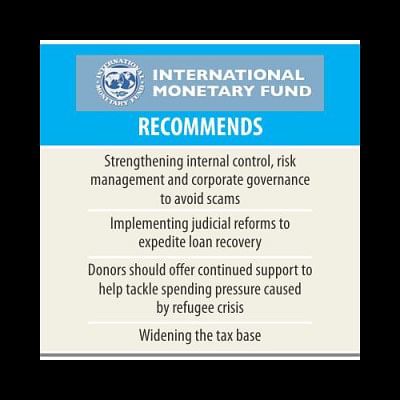IMF calls for more banking sector vigilance

The International Monetary Fund yesterday called for strengthening of internal control, compliance and risk management to avoid financial scams in the banking sector.
Judicial reforms should be implemented to expedite loan recovery in reducing the non-performing loans, said Daisaku Kihara, who led an IMF team to Dhaka on a 12-day visit.
The team met with the finance minister, the Bangladesh Bank governor, the finance secretary, the chairman of the National Board of Revenue as well as representatives of the business and banking sectors, labour unions, think-tanks, and development partners.
Mobilising long-term capital for growth will depend on policies to make the financial sector more efficient, he said at a press briefing held at the central bank headquarters in Dhaka to mark the conclusion of the visit.
“This will require enhancing banking sector regulation and supervision, in particular for the state-owned commercial banks.”
Asked what the IMF observation is over the recent financial scams unearthed in both the private and state-owned banks, he said the banks will have to ensure corporate governance to avoid scams.
Continued efforts to increase revenue collection are necessary to provide the much-needed fiscal space for boosting public investment and social spending.
“Public investment in infrastructure is especially important to improve the business environment, attract foreign direct investment, and diversify exports,” said Kihara.
The IMF official said special emphasis should be placed on broadening the tax base, implementing the delayed VAT reform and revising direct taxes.
“Further improvements in tax administration will boost revenues as well as reduce compliance costs and enhance transparency.” Bangladesh's tax-GDP ratio is less than many countries', but the gap will lessen if the new VAT law is implemented, he said.
Kihara said various challenges remain for Bangladesh to sustain the impressive economic performance of recent years. Macroeconomic performance is set to remain robust in the coming year and inflation broadly stable, said the IMF team leader, adding that foreign reserves remain adequate.
“Efforts to harness the country's growth potential while ensuring economic and financial stability will require creating fiscal space for infrastructure investments and social safety nets, making the financial sector more efficient, enhancing the business environment and strengthening governance.”
Monetary policy should be vigilant against inflation accelerating above the target after a recent pick-up in food inflation, Kihara said.
“Macro-prudential policies should aim to keep private credit growth in line with the authorities' target. Fiscal policy should keep the public debt ratio stable, while strengthening public investment management.”
He also touched upon the Rohingya refugee crisis. “The crisis could add spending pressures and continued financial support from donors would be essential.”
Bangladesh has made remarkable progress in achieving inclusive growth, which has led to a substantial decline in poverty, but challenges remain, the IMF said.
The extent of financial inclusion in society is commendable, and the authorities should continue to strengthen the legal and regulatory framework of the banking sector and implement the upcoming financial inclusion strategy.
Higher expenditure on education and improvements in rural infrastructure should continue to boost the current low female labour force participation rates by enhancing job prospects, reducing the time spent on domestic tasks and increasing safety.
The IMF stands ready to support the government's reform efforts through policy advice and capacity building, including on monetary and fiscal policies, financial sector supervision and regulation, and macroeconomic statistics, according to Kihara.

 For all latest news, follow The Daily Star's Google News channel.
For all latest news, follow The Daily Star's Google News channel. 



Comments